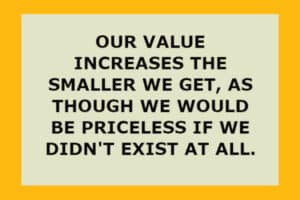Intuitive Eating, Part 3

From the two previous posts we might have guessed that few medical professionals in the obesity field are on board with Intuitive Eating, but in this mixed-up world of today, that could always change.
Not surprisingly, Elyse Resch, one of the Intuitive Eating pioneers had, in her 30s, alternated between self-starvation and binging. Journalist Michelle Ruiz quoted her:
“I would try not to eat lunch, and in the afternoon, I couldn’t take it anymore and I’d eat something and then feel so guilty that I’d broken my ‘willpower,’” Ms. Resch said, adding that controlling her food had been an escape from her strained first marriage.
That is an interesting fact. In a troubled relationship, the most affected partner does not know whether to fight, flee, surrender, or lie down and die. So this sounds like displacement behavior, something to drain off excess brain energy. Ruiz also says,
Intuitive eating practitioners work on their own or with a dietitian; there are 2,000 certified intuitive eating counselors across 40 countries.
For followers of this philosophy, success seems largely to depend on a person’s ability to tune in to their own body’s signals of both hunger and satiation. This is not a widely-shared talent, especially among people who enjoy alcohol before, during, or after their meals. One negative experience is related by Adina Kish, a woman in her early 20s who gave it her best shot for a year and a half. Ruiz writes,
Trying intuitive eating for 18 months between 2020 and 2021 led her to “essentially binge eating,” Ms. Kish said, summarizing her resulting mentality as, “I should be able to eat anything, so I’m going to eat everything.” For some, intuitive eating amounts to an oversimplification — an ineffective response to the complex ways so many people relate to food.
At Michigan Medicine, Andrew Kraftson bears the long title of clinical associate professor of metabolism, endocrinology and diabetes, along with being director of the weight navigation program. In his view, the body is not always a reliable advisor regarding what should be fed into it, because “there is hormonal, neurobiological and metabolic dysregulation that can happen.”
Furthermore, a seemingly small weight change can bring about disproportionate benefits. For instance, for people in a pre-diabetic state, “if they lose 5 percent to 7 percent of their weight, they reduce their chance of developing full-blown diabetes by 60 percent.” People with hypertension and sleep apnea can also benefit greatly from seemingly small reductions.
Ms. Ruiz also spoke with a registered dietitian nutritionist, Liz Brinkman, who also became certified as an intuitive eating counselor. But over time, she has come to feel that its principles are based on some unstated assumptions about people that are not often true; for example, that they are “adequately resourced with time, money, and a sense of agency.” Sadly, these qualities apply to a quite small and inordinately privileged sub-group of humanity.
Many other professionals, including Dr. Pretlow, wish that people would “Honor your body” and “Honor your health,” but do not mean the same thing by it that the Intuitive Eating proponents do.
Your responses and feedback are welcome!
Source: “They Rejected Diet Culture 30 Years Ago. Then They Went Mainstream,” NYTimes.com, 01/18/23
Source: “10 Principles of Intuitive Eating,” IntuitiveEating.org, undated
Image by Fernando de Sousa/CC BY-SA 2.0









 FAQs and Media Requests:
FAQs and Media Requests: 











